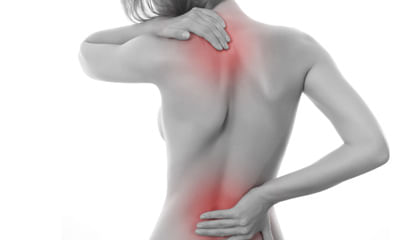Get the App
For Doctors
Login/Sign-up
Last Updated: Aug 29, 2019
BookMark
Report
5 Winning Way to Reduce Muscle Tightness and Pain.
5 winning way to reduce muscle tightness and pain.
Drinking plenty of water, often considered to be between eight to ten glasses per day, provides many benefits such as preventing and relieving tight and cramped muscles related to dehydration. However, tight muscles can have a variety of causes and might require dietary and lifestyle changes to adequately deal with.
Minerals, electrolytes and water are all needed for normal muscle tone and function. Calcium is especially important for contraction, magnesium is needed for relaxation, and water for firmness and electrolyte exchange.
Athletes commonly have tight muscles and also people who are under stress. Tight muscles lose their flexibility and might become painful to the touch. Mineral deficiency, especially magnesium, can lead to muscle tightness, twitching and maybe even restless leg syndrome at night. A lack of electrolytes, such as sodium, interferes with nerve conductance to muscle fibers and results in tightness and spasms. Poor blood circulation hampers the minerals, electrolytes and water getting to muscles, which can cause symptoms.
Most of us drink a lot of beverages but it has either caffeine or alcohol which can both lead to mild dehydration.
5 winning ways to reduce muscle tightness and pain.
1. Drink plenty of water (recommended about 8 glasses a day)
2. Reduce caffeine and alcohol intake. (cut down tea, coffee, aerated drinks, alcohol). Alcohol and caffeine cause mild dehydration which can lead to muscle tightness.
3. Foods that reduce muscle tightness and cramps
Foods rich in magnesium such as bananas can help. Use sea salt with food as the sodium in it helps relax muscle cramps. Potassium rich foods such as avocados, potatoes, bananas, broccoli, orange juice, soybeans, apricots, and raisins can decrease tightness and cramps. Milk has a large amount of vitamin d, which will reduce your chances of cramping. Have one to two glasses of milk each day to help you prevent cramps. As a bonus, all the calcium in whole milk will also contribute to healthy bone growth.
4. Stretching exercises.
Stretching exercises will help release chemical substances called endorphins that help reduce pain. Also it helps elongate tight and contracted muscle fibers.
These are links to some simple stretches but check with your doctor if it is appropriate for you to do the same.
Http://www. Wikihow. Com/stretch-your-legs
Http://www. Wikihow. Com/stretch-your-back
5. Massage to relieve pain from tight muscles.
Deep tissue massage, trigger point release and myofascial release are some of the techniques used by physiotherapists trained in manual therapy to help loosen painful knots in muscles and relax the same.
If pain and tightness persists consult a health practitioner for evaluation and treatment.
Drinking plenty of water, often considered to be between eight to ten glasses per day, provides many benefits such as preventing and relieving tight and cramped muscles related to dehydration. However, tight muscles can have a variety of causes and might require dietary and lifestyle changes to adequately deal with.
Minerals, electrolytes and water are all needed for normal muscle tone and function. Calcium is especially important for contraction, magnesium is needed for relaxation, and water for firmness and electrolyte exchange.
Athletes commonly have tight muscles and also people who are under stress. Tight muscles lose their flexibility and might become painful to the touch. Mineral deficiency, especially magnesium, can lead to muscle tightness, twitching and maybe even restless leg syndrome at night. A lack of electrolytes, such as sodium, interferes with nerve conductance to muscle fibers and results in tightness and spasms. Poor blood circulation hampers the minerals, electrolytes and water getting to muscles, which can cause symptoms.
Most of us drink a lot of beverages but it has either caffeine or alcohol which can both lead to mild dehydration.
5 winning ways to reduce muscle tightness and pain.
1. Drink plenty of water (recommended about 8 glasses a day)
2. Reduce caffeine and alcohol intake. (cut down tea, coffee, aerated drinks, alcohol). Alcohol and caffeine cause mild dehydration which can lead to muscle tightness.
3. Foods that reduce muscle tightness and cramps
Foods rich in magnesium such as bananas can help. Use sea salt with food as the sodium in it helps relax muscle cramps. Potassium rich foods such as avocados, potatoes, bananas, broccoli, orange juice, soybeans, apricots, and raisins can decrease tightness and cramps. Milk has a large amount of vitamin d, which will reduce your chances of cramping. Have one to two glasses of milk each day to help you prevent cramps. As a bonus, all the calcium in whole milk will also contribute to healthy bone growth.
4. Stretching exercises.
Stretching exercises will help release chemical substances called endorphins that help reduce pain. Also it helps elongate tight and contracted muscle fibers.
These are links to some simple stretches but check with your doctor if it is appropriate for you to do the same.
Http://www. Wikihow. Com/stretch-your-legs
Http://www. Wikihow. Com/stretch-your-back
5. Massage to relieve pain from tight muscles.
Deep tissue massage, trigger point release and myofascial release are some of the techniques used by physiotherapists trained in manual therapy to help loosen painful knots in muscles and relax the same.
If pain and tightness persists consult a health practitioner for evaluation and treatment.



+1.svg)
